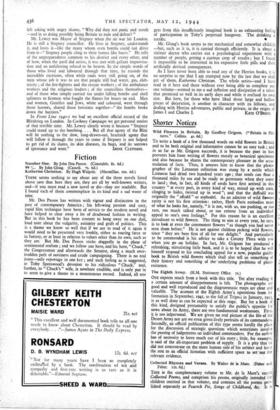Shorter Notices To write a book of a few thousand
words on wild flowers in Britain and to be both original and informative cannot be an easy task ; and in so far as Mr. Grigson succeeds, it is because the poet in him prevents him from writing of flowers merely as botanical specimens and also because he shares the contemporary pleasure in the accu- mulation of facts. Thus, it amuses him to know that the photo- grapher of the Linnaean collection was stung by a nettle which Linnaeas had dried two hundred years ago ; that seeds can float a thousand miles by sea and be ready to germinate when they come to land ; that, in fact, all kinds of seeds have first arrived in this country " at every port, in every kind of way, mixed up with corn, clinging to hides, twisted up in wool "; and that the daffodil was originally the " affodil" or asphodel. As an admirer of wild flowers rarity is not his first criterion: rather, Herb Paris embodies most of what he looks for, namely, "it is not, with us, too pushing, or too rare, too much talked about, or too remote from an individual appeal to one's own feelings." For this reason he is an excellent introducer to wild flowers. The thing to aim at every year, he says, is to look at even the commonest flowers " as though you had never seen them before." He is not against children picking wild flowers, since " they are here first of all for our delight." And particularly to be commended is his advice to take a County Flora with you when you go on holiday. In fact, Mr. Grigson has produced a refreshing, stimulating little book, and it is to be hoped that he will himself respond to his concluding appeal for a new, popular guide- book to British wild flowers which shall also tell us something of their history and something of the underlying problems of plant- existence.


























 Previous page
Previous page